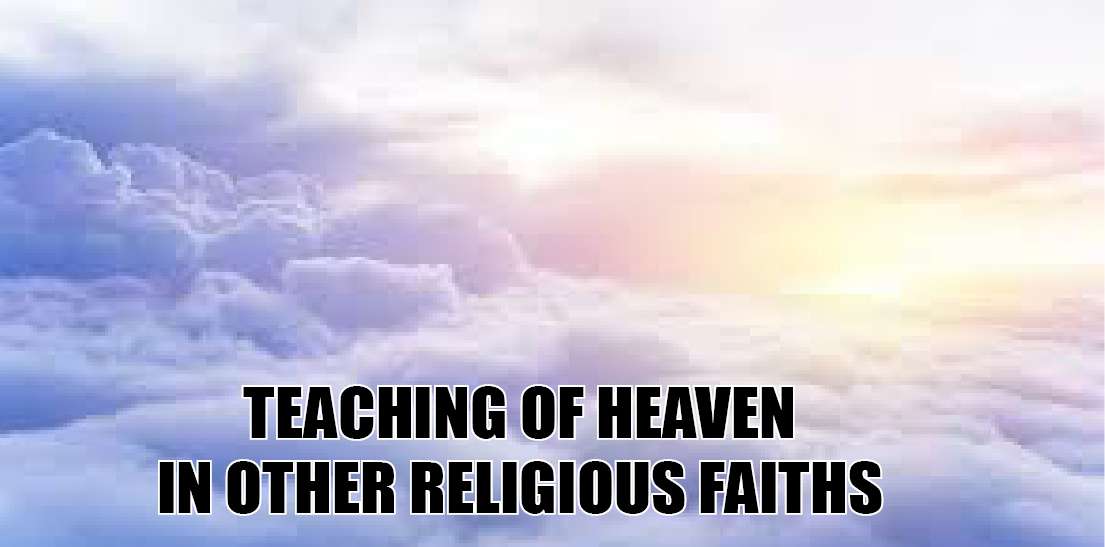

Teaching of Heaven in Other Religious Faiths
Dr. Mathew Varkey
Introduction
The concept of heaven is so important and vital in Christian theology. The Bible says that our heavenly father is preparing a wonderful home in heaven for all of the redeemed . “Believe in me, in my father’s house are many rooms. If it were not so would I have told you that I go to prepare a place for you?.... where I am you may be also. (John:14:2,3) King Solomon called it the heaven of heavens (1 king:8:27) This world is filled with sorrow , pain and suffering but in heaven this will be no more pain, for the former things are passed away and God makes all things new. We do believe that there is a reckoning day when unbelievers will be punished in hell (Rev 20:12) the righteous will be rewarded in Heaven (Rom: 14:10, 1 Cor :3:9-15). But the entire Religions except Christianity do not speak much about salvation, Heaven or Hell, rather it give some vague ideas about life after death. In this article we are limiting our discussion to some major religions and its approach to the riddle of life.
(Eastern Religions don’t have notion of heaven like those in the west, instead they offer some kind of release from illusion).
Hinduism
The faith and practices of Hinduism is so vast that we cannot comprehend fully. Hinduism does not have a single book as scripture, rather there is an ocean of literature both is prose and poetry. It is an herculian task to explain the basic doctrines of Hinduism, the basic tenet of their faith is based on pantheism (pan-all, theism-God) where there is no place for a distinct an thropomorphic God. For the Hindu, the greatest goal in life is to attain moksha which means deliverance, emancipation and liberty from Karma Samsara. This indicates the consequences of actions (Karma) in this materialistic world (samsara) which flow through many existences as a chain and coming out of the chainis known as moksha. To attain moksha (liberation or salvation) Hindusim offers three margas (ways) namelyjnana marga. (the way of the knowledge) Karma Marga (the way of works) and Bhakti marga (the way of devotion). The path from avidya to vidya leads to moksha.
Religious philosophy which does not propagate the assurance of salvation is no longer fit to be called a True Religion No other path, no other truth, no other name except JesusChrist the victorious to lead us in to heaven.
Buddhism is an offshoot of Hinduism which came into existence about six hundred years before Christ and flourished in our soil for about one thousand years. ‘Dukha’ is the watchword of Buddhism and it declares that life is full of sorrow. Enlightenment or Nirvana (Nibbana- pal) is the only way to escape from the Dukha Samsara (the world of sorrows). Although an atheistic religion, it offers the way of salvation which is fullywithin the efforts of oneself. (Do it yourself religion) for forty five years the Bhudha travelled all the provinces of Northern India and gave away the message of hope and happiness. He found out the cause and cure of Dukha (suffering) and summarized it in four Noble truths as follows:-
1) Suffering is a universal fact
2) The cause (origin) of suffering Desire
3) There is a state in which this is complete freedom from suffering and bondage – Nirvana
4) There is a way that leads to nirvana – Eight fold path; which consists of eight principles of duties namely Right speech, Right Action, Right Livelihood, Right
effort, Right mindfulness, Right concentration, Right views and Right thought. This middle path leads to wisdom and insight which dispe ignorance. Its fruit is serenity and enlightenment, in other words it is nirvana – the state of perfect peace and bliss (extinction). Buddhism does not teach that man has and eternal indestructible soul. Since all things are subject to pain and decay, there can be nothing permanent. Thus, Buddhism teaches a person to trust himself and make use of his inherent power to achieve his goal in life. Since Buddhism teaches anatta (no soul) , it is senseless to think of heaven or hell.
Jainism
Was the 1st faction to spring from Hinduism as a protest movement during 6th century BC. Mahavira (great hero) denied the existence of God and his worship.Main teachings are self- denial and non violence. Adherents were asked to practice renunciation of five sins namely.
a) Killing living things
b) Lying
c) Greed
d) Sexual pleasure and
e) Worldly attachments
This ancient religion teachers that the way to liberation and bliss is to live a life of non violence, renunciation and fasting. Jainist denies existence of a supreme being who created the cosmos and accepted the cyclical nature of universe, without beginning and without end. There is no mention of heaven or hell inJainist teachings and they taught that the ultimate aim of man was to know himself- to fulfill himself rather than to reach God. Man could achieve this aim through severe self discipline and self control. In short Jainism keeps silence, regarding the faith of man after the death; hence no mention of sin, resurrection, judgment and heavenly aboved.
Sikhism
Started as a reform movement in Hinduism, later became a new religion under the leadership of Guru Nanak. The sikhs are the disciples of Gurus and their holy scripture is known as Guru Granth Sahib.Theologically there is nothing clearly distinctive in Sikhism. Sikhism was the outcome of the conscious effort to harmonize the rival parties namely Hindus and Muslims. Sikhism is basically a monotheistic religion . The one and only God is regarded as creator, sustainer and destroyer of the world. Sikhism bilieves in the possibility of salvation which means freedom from the cycle of birth and death. Bhajan, Kirtan and Nama (repeating the name of God) and consideredas means to liberation. Apart from that , Sikhism also emphasises Gods grace and gurus help to attain moksha. The unique feature of sikh theology is that it refers supreme being as teacher. According to sikh philosophy God is without caste without birth, self- existent, without attachment and without illusion. The world is the creation of God. Adi Granth says’ By Hukam (divine will) thou didst create all form. True service of God and devotion to him are means of release. Man according to Sikhism seems to be the most privileged creation of God. Man is blessed with the light of reason and discrimination (Adi Granath P.913). Man is an embodied immortal soul and God is present in thebody. The final destiny of God realization is freedom from suffering due to the endless transmigration of the soul just like the Hindu eschatology. Sikhism believes that it is a certain measure of God’s grace that he has blessed us with the human birth salvation or moksha is conceived as union with God and escape from the cycle of rebirth. The teaching of the concept of Moksha or salvation is very vague in Sikhism and there is no mention of resurrection, judgment, Hell or Heaven in the sacred books.
Islam
The word Islam means – surrender (to the will of God) The Muslim creed begins with the words ‘there is no God except Allah’ God is unique and nothing resembles God. Quran and Muslim theological writings describe the universe in traditional ways, They suggest that Heaven is a place beyond the skies in which the planets move. Heaven is described as a place of cool gardens with riversand fruit treesin which the blessed will be at rest eternally (47:15, 56:15-23). The Islamic world view speaks of Hell as a place of punishment; the wicked are sent to that area. Islam believes that God appointed human beings to be His agents on earth and gave them the earth with all its innumerable resources. Hence they became the servants of God (abdu llah) the Quran tells how satan deceived Adam and his wife . Because of this they were driven out of the Garden. But God in His mercy gave guidance to men. The guidance of guidance of God comes through the natural world , through his angels, through the scriptures and through the prophets.
Muslims believe that the sovereign Lord will judge the world. On that occasion angels will bring of every one for judgment. Their deeds will be weighed in the scales. Those who pass the test will be admitted to paradise and those who fall will be sent Hell (18:49,17:13-15).
Heaven is a garden where the faithful lie upon couches in a climate controlled environment. They will drink from crystal goblets and silver vessels as immortal youths, looking like scattered pearls .Four outstanding features characterize the Muslim view of last things such as the sounding of the trumpets, the descent of the Record, the scales (contain the good and bad seeds of man) and the narrow bridge to be crossed. Resurrection of the body and Day of Judgmentare so vital in Islamic theology. But it is ambiguous and difficult to cope up with Kayamat (day of judgment) and pre-destination theory. It is desirable to have a serious study of day of reckoning and heaven, both in Christianity and Islam.
Zoroastrianism
Although professed by the parsis in India it deserves our attention because of the Zoroastrian concept of heaven, (paradise) hell, sin and salvation and world and God. The God of Zoroastrianism is known as Ahura Mazda (the wise God) representing astrict monotheistic God. The world is created by God and fully dependent upon Him. The entire cosmos is viewed as a stage of constant struggle between light and darkness . According to Zoroastrianism man who is created by god is expected to join hands with him to extinct all evil forces from the world. Human beings are created by Ahura mazda with free will to choose good or bad. One has to cross the bridge of the separator (Chinvad Bridge) and enter in to paradise (hows of songs) and that is salvation , where as evildoers will not be abled to cross the bridge and will God to hell (house of demons) and that is their reward as punishment.
It was the ancient Persians who gave us the word paradise which means a walled garden or park. Zoroastrianism gave us notions of the afterlife and it is believed that jews, Christian and muslims adopted and adapted this concept in to there religion. In short Zoroastrianism stands as a beacon light for many religions.
Judaism
Many faith have definitive teaching about the afterlife. But the answer to the question what happened after we die? The torah, the most important scripture for jews is surprisingly silent. Nowhere does it discuss the afterlife in detail. Judaism speaks of (Gan Eden) the heavenly garden of eden, final stage of Olam Haba (after life) and (gehena) as the place of punishment for evil people. The Pharisees implied notion of an afterlife whereas saducees, there was no biblical evidence of such notion. They did not believe resurrection. Over the millnia jews have come to believe in various versions of heaven some of which occurs after the messiah comes and involve the righteous dead coming back to life. Still over all judiasm is more concerned with life in here and now. Judism also does not give us a clear picture about heaven and hell.
While all other religions wander in ambiguity with regard to after life, they of reckoning, judgment heaven and hell, we do believe that “absent from the body and present with Lord, we shall always be with lord (1 Thes 4:16-17). May good Lord help us to be with him always in his heavenly abode.


